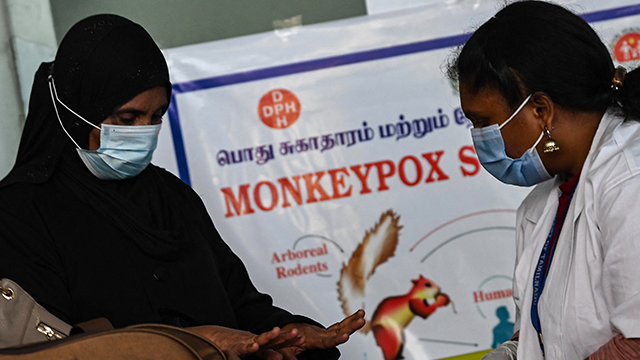The World Health Organization (W.H.O.) has dismissed the term monkeypox as inherently racist, decreeing “mpox” should be used instead when referring to the virus as a way of sparing the feelings and easing the stigma of those enduring an attack.
The Geneva, Switzerland-based organization said the move had been prompted by concerns not just over implied racism inferred by anyone who uses the term but lamented it stigmatized sufferers earlier this year when the term gained common usage.
“In several meetings, public and private, a number of individuals and countries raised concerns and asked W.H.O. to propose a way forward to change the name,” it said.
Monkeypox was originally so-named because the virus was originally identified in monkeys kept for research in Denmark in 1958.
The W.H.O. flagged the pending change earlier this year by forming a committee to investigate the matter, as Breitbart News reported.
????This group of global experts – convened by WHO – agreed on new names for #monkeypox virus variants, as part of ongoing efforts to align the names of the monkeypox disease, virus, and variants—or clades—with current best practices. https://t.co/G375WraUz0
— World Health Organization (WHO) (@WHO) August 13, 2022
The disease has been found in a number of animals and most frequently in rodents, before crossing species and infecting humans.
The W.H.O. said when making the decision it considered scientific appropriateness, its use in different languages, the absence of geographical or zoological references and the ease of retrieving of historical scientific information.
“Mpox will become a preferred term, replacing monkeypox, after a transition period of one year,” the organization said. “This serves to mitigate the concerns raised by experts about confusion caused by a name change in the midst of a global outbreak.”
British officials have told those suffering from monkeypox that they should abstain from sex in the hopes of curbing the spread of the disease. https://t.co/x9WkcWK7C3
— Breitbart News (@BreitbartNews) June 1, 2022
The Foreign Press Association, Africa, previously asked Western media outlets to avoid using images of Africans when showing monkeypox.
“As any other disease, it can occur in any region in the world and afflict anyone, regardless of race or ethnicity,” the group said.
The group added that it was “disturbing” media outlets would instantly use images of black skin when showing monkeypox.
OUR STATEMENT:
The Foreign Press Association, Africa registers its displeasure against media outlets using images of black people alongside stories of the #monkeypox outbreak in North America and the United Kingdom. pic.twitter.com/u32yWLELJg
— The Foreign Press Association, Africa—FPAA. (@FPA_Africa) May 21, 2022
Monkeypox is a rare disease that was first detected among humans in the Democratic Republic of the Congo in 1970.
Though it sometimes spreads to other nations, the disease is mostly located in central and western Africa. It often transmits from animals (primates or rodents) to humans through a bite or scratch.
Assigning names to new and to existing diseases is the responsibility of W.H.O. under the International Classification of Diseases and the W.H.O. Family of International Health Related Classifications through a consultative process, ABC News reports.




